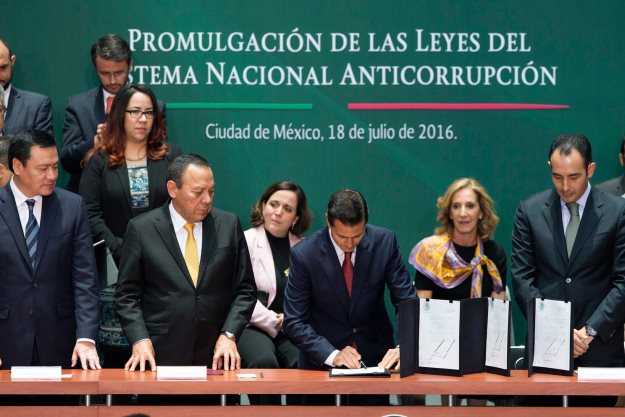Eighteen months ago, I wrote in AQ about the success of Mexico’s citizen-driven corruption fight in Congress. Civil society groups, academics and activists had pushed for the rejection of a watered-down anti-corruption bill and instead presented their own, sharpened version of the legislation. This citizen’s bill, called #Ley3de3 (or #Law3of3) promised not only to help identify, punish and prevent corruption, but to do so while promoting collaboration among different federal institutions and citizen groups.
Congress agreed to discuss the bill only after 634,000 citizens signed their support, and approved it only after trying several times to reduce its scope. Passage of the #Ley3de3 thus marked one of the most important breakthroughs for Mexico’s civil society since democratization began in the late nineties.
All of us who were part of this effort knew that it was a first step, but were sure that many more would follow. Little did we know how resistant to outside pressure – from civil society, the media and others – the government would prove to be when it came to cleaning up its act.
Since its passage, Congress has stalled consolidation of the anti-corruption system of which the #Ley3de3 was a critical part. Of the seven chairs that were supposed to oversee and coordinate anti-corruption policies under the bill, one of the most important, that of the anti-corruption prosecutor, remains empty.
The most apparent reason for this is partisan politics. The Mexican Senate, which is tasked with selecting the prosecutor, has instead blocked his or her nomination out of fear of what will follow: A prosecutor with the mandate to conduct criminal proceedings against corrupt officials. Any form of partisan control over the office could turn Mexico’s well-intended anti-corruption battle into a witch hunt against political opponents. The parties in Congress are thus doing what they can do fill the position with a friendly face.
A second reason lies in the creation of Mexico’s first-ever independent attorney general’s office, which will take effect in 2018. When it does, the selection of the anti-corruption prosecutor will become a responsibility of Mexico’s new attorney general. This is a problem. The current attorney general, Raúl Cervantes, is a prominent member of the incumbent party (PRI), and one of its most loyal lawyers. Earlier this month, he was accused of trying to evade taxes on a Ferrari sports car (he chalked the incident up to an administrative error). If Cervantes were to remain in office and assume this new role, the autonomy of the anti-corruption prosecutor could be severely threatened, as he could provide a de facto amnesty to a PRI administration.
Opposition parties and members of citizen movements have mobilized over the hashtags #VamosPorMas (#Let’sGetMore) and #FiscaliaQueSirva (#Prosecutor’sOfficeThatWorks) to stop Cervantes’ candidacy. They’ve also prepared a second citizen bill (possibly to be discussed by Congress in coming weeks) to create impartial conditions at the prosecutor’s office. Until this bill is passed, or an independent prosecutor is selected by the Senate, anti-corruption institutions created in 2016 will remain incomplete.
Mexicans have grown accustomed to corruption scandals that go unpunished. Seventy-two percent of them consider corruption the most significant problem facing the country. When the #Ley3de3 was approved in July 2016, Mexicans were enthusiastic about the prospect of change and felt empowered to make it happen. Pushback from the government has been frustrating, but it is not decisive; it is now more important than ever to keep pressure on public officials.
In this, the population has found an ally in the media. Just days before Mexico was hit by its strongest earthquake in a century on Sept. 9, online newspaper Animal Político and Mexicanos Contra la Corrupción, a think tank, presented a wide-ranging exposé on public corruption. It revealed that the government in the state of Oaxaca, one of the most severely affected by the earthquake, had failed to distribute 6,000 seismic alert systems that could have had saved dozens of lives. Investigative journalism of this kind is essential for moving the public to demand accountability. But more of it is needed.
In Mexico, at least 16 governors are in prison or have fled prosecution on corruption-related crimes; many more public officials still need to be brought to justice. The country’s next giant step forward on corruption is the selection of an independent and autonomous anti-corruption prosecutor. The citizens demand it – and we aren’t going away.
—
Rios is a global fellow at the Mexico Institute in Washington, D.C., and one of the four distinguished activists selected by Mexico’s Senate as jury of the National Anti-Corruption Citizen Committee. She holds a Ph.D. from Harvard.








